Let’s talk about something that’s crucial for every gambler – understanding your risk tolerance. You know how people always say “know your limits” when it comes to gambling? Well, it goes way deeper than just setting a basic budget for yourself.
Think of risk tolerance like your comfort zone when riding a roller coaster. Some folks love the front seat and throw their hands up on every drop, while others prefer the middle cars where it feels a bit more controlled. Gambling’s pretty similar, actually.
Your personal comfort level with risk influences every single decision you make at the casino. It’s not just about the money in your pocket, but also about how you handle those stomach-churning moments when the cards aren’t falling your way. Some players can brush off a big loss and keep their cool, while others might feel anxious even with small bets.
Here’s the thing – there’s no right or wrong level of risk tolerance. What matters is being honest with yourself about where you stand. Are you the type who gets a thrill from big bets, or do you prefer playing it safe with smaller stakes? Maybe you’re somewhere in between?
Not understanding your own risk comfort zone can lead to some pretty rough situations. We’re talking about more than just empty pockets – it can affect your relationships, stress levels, and overall enjoyment of the game. So take a moment to really think about what kind of gambler you are and what kind of pressure you can genuinely handle. Trust me, your future self will thank you for it.
What Is Risk Tolerance
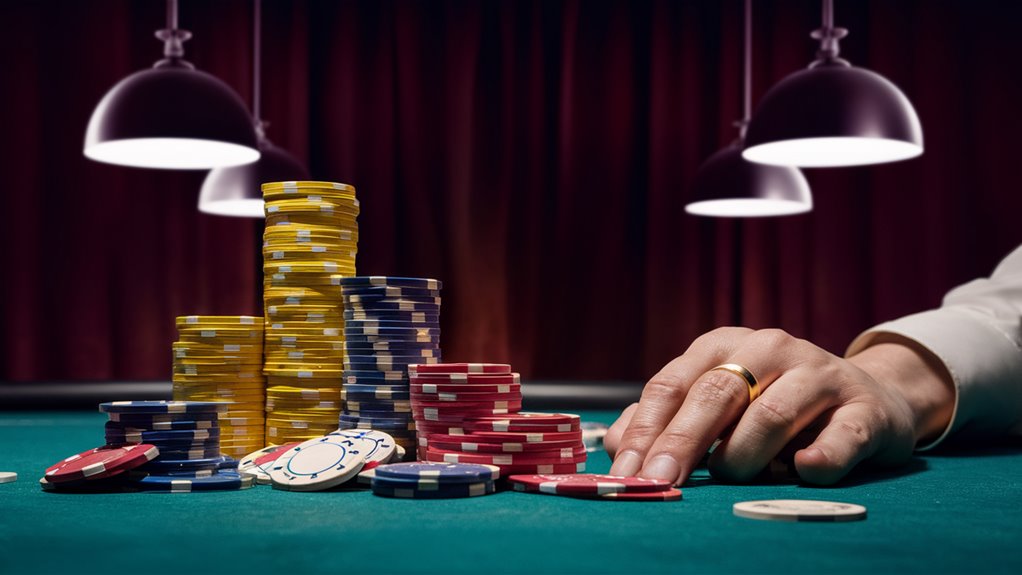
Let’s talk about risk tolerance – you know, that tricky balance between taking chances and staying comfortable with your investment decisions. Think of it as your personal comfort zone when it comes to handling potential ups and downs in the market.
Ever wonder how much uncertainty you can actually handle? Well, risk tolerance is like your financial stress meter. It shows how well you cope with seeing your investments fluctuate before anxiety kicks in and you start making decisions based on emotions rather than logic.
Getting to know your risk tolerance is pretty straightforward if you break it down into two parts.
First, there’s the money side – how much can you realistically afford to lose without it affecting your daily life or keeping you up at night? Consider your regular income, what you’ve got saved up, and those monthly bills that need paying.
But here’s the interesting part – it’s not just about the numbers. Your emotional makeup plays a huge role too.
Some people can watch their investments drop by 20% and still sleep like a baby, while others start sweating at the mere thought of a 5% dip.
Something many folks don’t realize is that risk tolerance isn’t set in stone. It shifts and changes as your life does.
Maybe you were fine with aggressive investments in your twenties, but now that you’ve got a family or retirement’s on the horizon, you’re looking for something more stable. That’s totally normal.
The key is being honest with yourself about where you stand. When you really understand your risk comfort level, you’ll make smarter 소셜미디어 도박 홍보 investment choices and stick to your strategy even when markets get choppy.
It’s like knowing your limits at the gym – push too hard and you might hurt yourself, but stay within your comfort zone and you’ll see steady progress.
Assessing Your Financial Boundaries
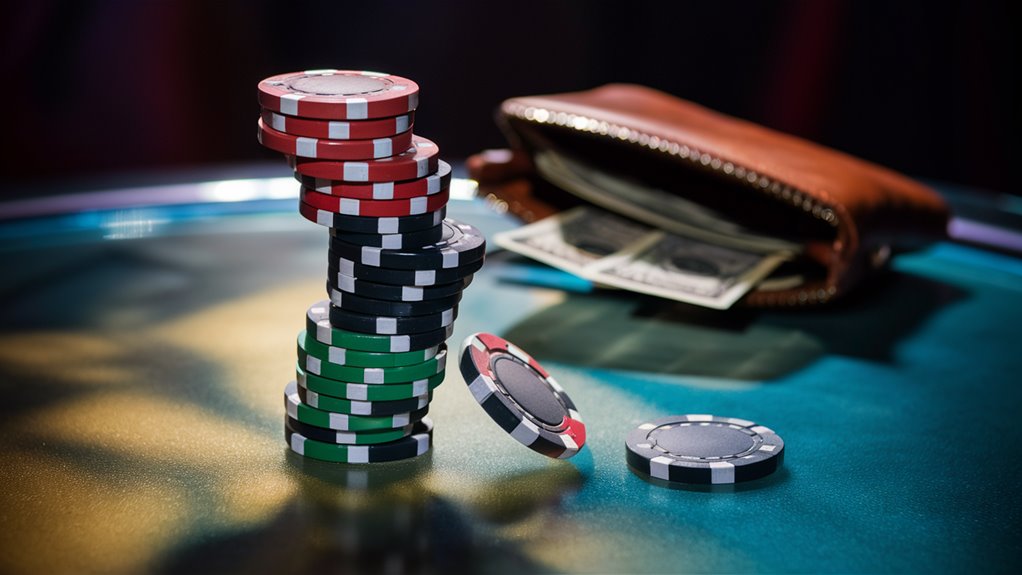
Let’s talk about setting smart money boundaries when it comes to gambling. You know how easy it’s to get caught up in the excitement, right? That’s why having clear financial limits is super important – think of them as your personal safety net.
First things first, take a good look at your monthly cash flow. What’s coming in, and what absolutely needs to go out?
Start by listing all those non-negotiable expenses like rent, groceries, utilities, and don’t forget about putting some money aside for savings. Whatever’s left after covering the essentials? That’s what you might consider for gambling activities.
Now, here’s where it gets practical. You’ll want to set two key limits: how much you’re willing to bet on a single game or round, and your total gambling budget.
Remember, this should be money you can lose without losing sleep over it. A smart approach is breaking down your gambling budget into smaller chunks – maybe weekly allowances instead of one big monthly amount.
Keep tabs on every dollar you spend while gambling, just like you’d track your coffee expenses or shopping habits. When you notice you’re getting close to your limit, that’s your cue to step away.
And hey, we’ve all been tempted to chase losses, but that’s exactly when your predetermined limits become your best friend.
Pro tip: Consider opening a separate account just for your gambling funds. It’s like having different jars for different purposes – when the gambling jar is empty, you know it’s time to stop.
The key to responsible gambling isn’t just setting these boundaries; it’s sticking to them, no matter what. After all, the best gambler is one who knows exactly when to walk away.
The Psychology of Loss
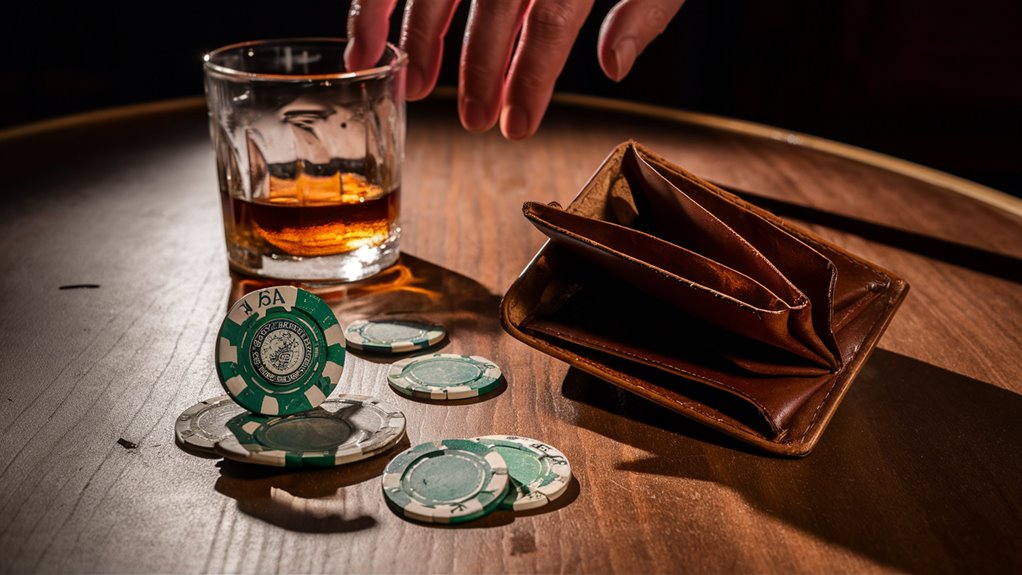
Let’s talk about how our brains handle losses – it’s actually pretty fascinating. You know how losing $100 feels way worse than the excitement of winning the same amount?
That’s not just you being dramatic. Our brains are literally wired to feel losses more intensely than gains. Scientists call this loss aversion, and it really messes with how we make decisions about risk and money.
Here’s the thing about facing losses – they can really throw us off our game. When we’re down, our brain goes into a kind of panic mode.
Stress hormones like cortisol start flooding in, and before we know it, we’re making choices we’d never usually make. Maybe we start betting bigger to recover losses, or we toss our careful plans right out the window. It’s like our rational brain takes a back seat while our emotions grab the wheel.
But don’t worry, there are ways to handle this psychological rollercoaster. First up, you’ve got to accept that losses are just part of the deal.
Think of it like bad weather – it’s not fun, but it’s going to happen sometimes. Try setting aside a specific amount you’re mentally ready to lose, kind of like a rainy day fund.
When things get intense, take a breather. Simple stuff like deep breathing can really help clear your head.
And hey, keep a little journal of how you react to losses. It might sound silly, but tracking your responses can help you spot patterns and adjust your approach. Trust me, understanding your own mind is half the battle here.
Setting Realistic Gambling Goals

Let’s get real about gambling goals for a minute. You know how easy it’s to get carried away when you’re feeling lucky?
That’s exactly why we need to talk about setting some smart limits before you even start.
Think of gambling like planning a night out – you wouldn’t go to a fancy restaurant without knowing your budget, right? The same goes here.
First things first, figure out what you can honestly afford to spend without touching the money for bills, groceries, or your savings. No exceptions on this one.
Breaking things down into smaller chunks really helps. Instead of dreaming about hitting the jackpot, try setting practical goals like “I’ll stick to two-hour sessions” or “never bet more than a tiny slice of my bankroll at once.”
It helps to jot these down somewhere – maybe in your phone or a small notebook. Give them a quick glance before each session to stay on track.
Here’s something a lot of folks overlook: be honest about where you’re at skill-wise. If you’re just getting started with poker, jumping into high-stakes games is like trying to run a marathon without training.
Start small, learn the ropes, and work your way up gradually. Trust me, those big tables aren’t going anywhere.
And listen, this is super important: gambling should never be your backup plan for making rent or paying off credit cards.
Think of it like going to the movies or bowling – it’s entertainment, not a financial strategy. Keep it fun by staying within those boundaries we talked about, and you’ll have a much better time overall.
Choosing Games That Match

Let’s talk about finding the right games that match your style. You know how some people love roller coasters while others prefer a gentle Ferris wheel? Well, picking games is pretty similar – it’s all about what makes you comfortable and keeps the fun going.
If you’re more of a play-it-safe person (and there’s nothing wrong with that), you’ll probably enjoy games that give you lots of small wins and keep you in action longer.
Think of games like blackjack or baccarat, where you can stretch your budget and enjoy steady gameplay without too many wild swings.
Maybe you’re somewhere in the middle? Well, games like roulette could be right up your alley. They’re kind of like ordering medium spice at a restaurant – you get some excitement without setting your taste buds on fire.
You can control your bets while still getting those thrilling moments.
Now, for those of you who love a good adrenaline rush, there are definitely options that match that spirit. Progressive slots and high-stakes poker can give you those heart-pounding moments where big wins are possible.
Just remember, these games can be like riding that roller coaster – there might be some stomach-dropping moments along the way.
But here’s the really important part: no matter which type of player you are, always match your budget to your game choice. It’s like grocery shopping – you wouldn’t buy caviar on a ramen noodle budget, right?
Keep it real with your bankroll, and you’ll have a much better time overall.
Bankroll Management Principles

Let’s talk about smart bankroll management, because getting this right can make or break your gambling experience. You know how easy it’s to get caught up in the excitement and lose track of your spending? Well, that’s exactly what we’re going to help you avoid.
At its heart, solid bankroll management comes down to three simple principles. First, you need to set clear limits before you start playing. This means figuring out your total gambling budget and deciding how much you’re comfortable risking each time you play.
Most seasoned players suggest keeping it between 1-5% of your total bankroll per session. Think of it like portioning out your meals for the week, just with money instead of food.
Now, here’s a practical tip: keep your gambling money completely separate from your regular spending cash. I mean totally separate, like different accounts if possible.
Let’s say you’ve set aside $1,000 for the month and you’re following a conservative 2% rule. That means you won’t risk more than $20 in any single session. Pretty straightforward, right?
The real game-changer is sticking to your loss limits, no matter what. We’ve all been there, feeling the urge to win back what we’ve lost, but this is where discipline comes in.
Once you hit your limit, you’ve got to walk away. Period. It’s like having a responsible friend tapping you on the shoulder saying, “That’s enough for today.”
Keep a record of how you’re doing and adjust your limits based on what’s working. Remember, successful bankroll management isn’t about winning every time you play.
It’s about staying in the game long enough for your strategy to work while protecting yourself from big losses. Think of it as playing the long game rather than going for quick wins.
Warning Signs of Overextension
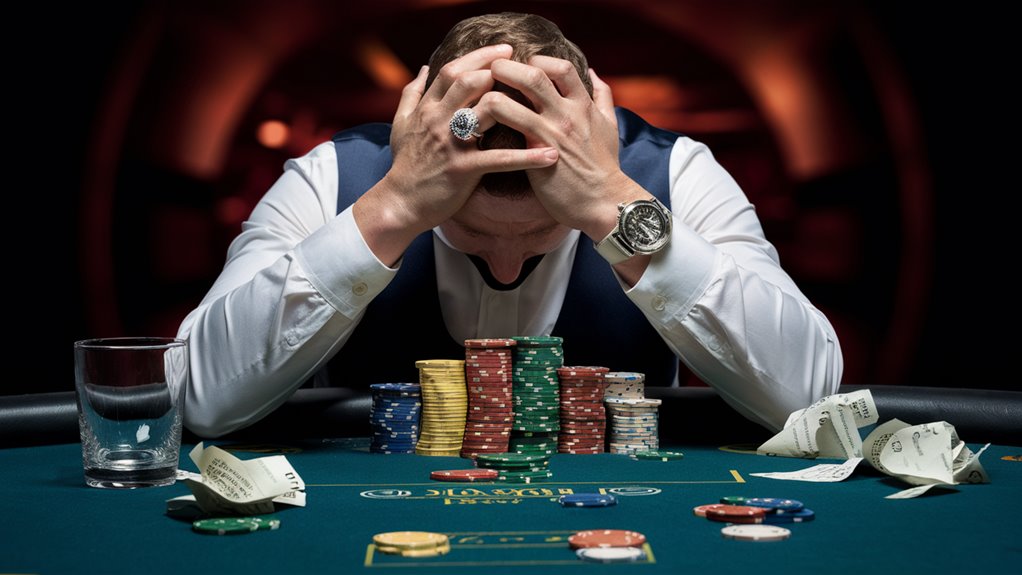
Let’s talk about something really important – knowing when you might be stretching yourself too thin with gambling.
You know how it goes, right? Even with the best money management plan in place, things can still get tricky if you’re not paying attention to the warning signs.
So what should you look out for? Well, some red flags are pretty obvious. If you’re borrowing cash to place bets or trying to win back losses by betting bigger amounts, that’s definitely cause for concern.
And here’s something many people don’t like to admit – hiding your gambling from family or spending way more time at it than you planned? That’s usually a sign things aren’t heading in the right direction.
Think about it this way: if gambling starts getting in the way of your regular life, like making you late for work or miss important events, it’s time to pump the brakes.
Same goes for breaking your own rules about how much of your bankroll to risk, or worse, dipping into money that’s meant for bills and everyday expenses.
But it’s not just about the money stuff. Your emotions play a huge role too. Are you hitting the tables or placing bets when you’re feeling down, stressed out, or angry? That’s usually a recipe for poor decisions.
And if you notice yourself getting antsy when you can’t gamble, constantly thinking about your next bet, or believing you just need one more win to fix everything – those are serious warning signs.
Remember, there’s no shame in taking a step back when you spot these signs. In fact, it’s the smart thing to do.
And if things feel like they’re getting out of hand, reaching out to a professional is always better than letting problems snowball.
Risk Versus Reward Balance

Let’s talk about finding the sweet spot between risk and reward when gambling. You know how it goes – everyone wants to win big, but nobody wants to lose their shirt.
The trick is figuring out where your comfort zone lies.
Think of it like investing in stocks. Before you put your money on the line, you’ll want to take a good look at two things: what you could win and what you might lose.
It’s not just about crossing your fingers and hoping for the best. You need to understand both the odds of winning and, more importantly, how much money you can actually afford to risk.
Here’s the thing about staying in control: setting clear boundaries is absolutely crucial. Start by deciding on a maximum bet that won’t keep you up at night if things don’t go your way.
And stick to that limit, no matter if you’re on a hot streak or trying to bounce back from a loss. Getting a bit more technical, try running the numbers on each bet. Multiply your chances of winning by what you’d win, then subtract what you’d lose times the probability of losing.
This gives you a clearer picture of what you’re really getting into.
Your personal comfort with risk really matters here. Maybe you’re more of a play-it-safe type who prefers smaller, more frequent wins.
Or perhaps you don’t mind some ups and downs for a shot at bigger payouts. Just remember one golden rule: there’s no such thing as a perfect betting system, and you should never gamble with money you need for bills, food, or other essentials.
Building a Sustainable Strategy
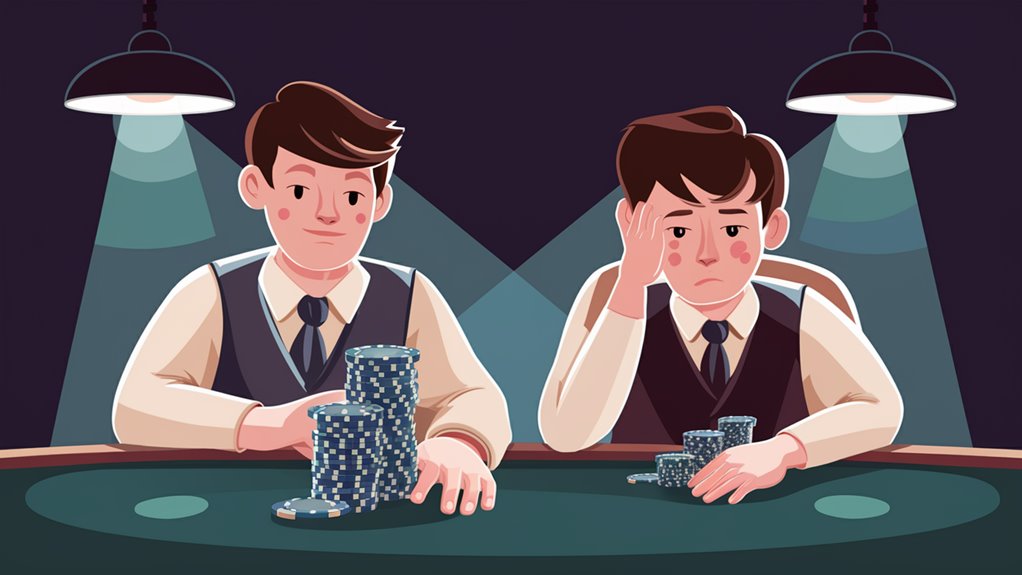
Let’s talk about building a strategy that’ll stick around for the long haul. You know how it’s tempting to just wing it and trust your gut?
Well, that rarely works out in the long run. What you really need is a game plan that you can follow through thick and thin.
First things first – take a good, honest look at your finances. Ask yourself how much you can realistically set aside for this activity without putting your rent, bills, or daily expenses at risk.
It’s kind of like creating a budget for entertainment, except this one needs extra careful planning.
Here’s a practical tip that smart players swear by: divide your bankroll into smaller chunks. Think of it like portion control for your wallet.
A good rule of thumb is to never risk more than 1-2% of your total funds on a single bet. This way, even if luck isn’t on your side for a while, you’ll still have plenty of ammunition left to bounce back.
Want to get really serious about improving? Start keeping a betting diary. Jot down everything – your wins, your losses, and what was going through your mind when you made each bet.
It’s amazing what patterns you’ll start to notice when you look back at your decisions.
And speaking of decisions, make sure you know when to walk away with your winnings. It’s super easy to get caught up in the moment and think, “Just one more bet!”
That’s usually when things start going south. Set yourself some clear profit targets and stick to them like glue.
Remember, the whole point is to have fun while staying in control. Treat it like entertainment rather than your next big income stream, and you’ll be much better off.
After all, the best strategy is one that keeps you in the game without keeping you up at night.
Creating Personal Gambling Limits
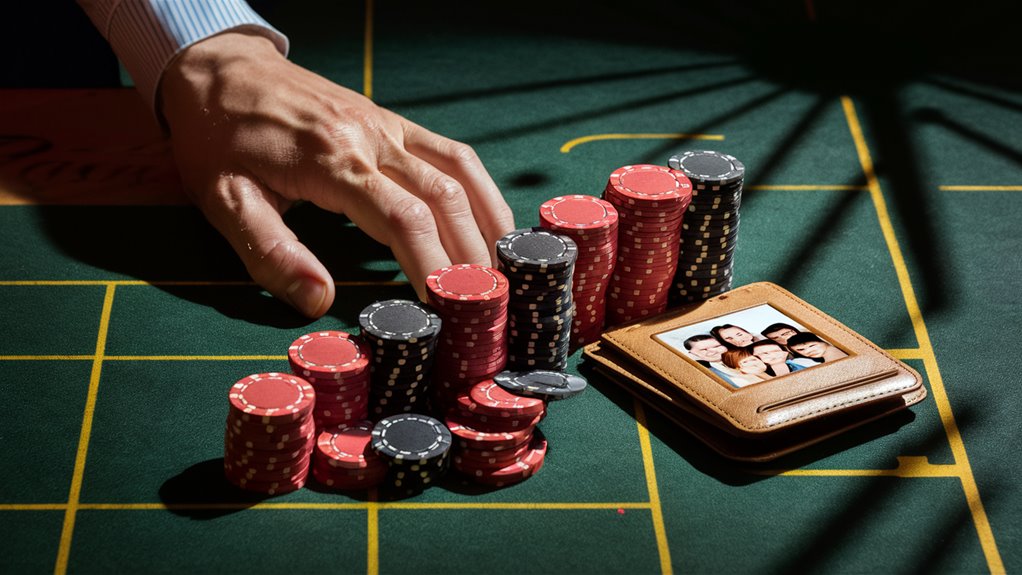
Let’s talk about setting personal gambling limits – it’s a crucial step that many people overlook. You know how easy it’s to get caught up in the excitement, right? Well, that’s exactly why we need to set some ground rules before diving in.
First things first, take a good look at your monthly budget. How much can you actually afford to spend on gambling without touching the money you need for important stuff?
We’re talking rent, groceries, bills – all those essential expenses need to be covered first. Whatever’s left over is what you can consider for your gambling budget.
Now, about managing your time. Think of it like setting an alarm for a power nap – you need clear start and stop points.
Maybe it’s two hours max per session, or no more than eight hours a week total. Most casinos these days have helpful tools to keep track of your playing time, so why not use them?
When it comes to money, you’ll want to set two types of limits. First, decide how much you’re willing to lose in one session and stick to it.
But here’s something people often forget – you should also have a win limit. Yeah, that’s right! When you’re ahead by a certain amount, it’s time to walk away with those profits in your pocket.
Your emotional state plays a huge role too. Having a rough day? Feeling down? Maybe you just lost more than you wanted? Take a breather.
Gambling when you’re not in the right headspace is like grocery shopping when you’re hungry – not the best idea.
Try keeping a simple record of your gambling activities. It doesn’t have to be fancy – just jot down when you play, how much you spend, and how you’re feeling.
Every few months, look back at these notes and adjust your limits if needed. Your financial situation changes, and your limits should too.
Common Questions
How Does Age Affect a Person’s Gambling Risk Tolerance Over Time?
Let’s talk about how our appetite for gambling changes as we get older. You know how when you’re in your twenties, placing big bets might feel like no big deal? There’s something about youth that makes us more willing to take those wild chances at the casino or sports betting.
When we’re younger, we tend to be more impulsive with our gambling choices. Maybe it’s because we’re still earning our first real paychecks and don’t have as many financial responsibilities weighing us down. Plus, there’s that feeling of invincibility that comes with youth, right? We might think we can easily bounce back from any losses.
But something interesting happens as we age. Our approach to gambling typically becomes more calculated and cautious. Think about it: by middle age, we’ve usually got mortgages, families to support, and retirement plans to consider. These responsibilities naturally make us think twice before placing those risky bets.
It’s not just about having more to lose, though. Our brain chemistry actually changes over time, making us less likely to chase those gambling thrills. We start to appreciate the value of steady, measured decisions rather than going all-in on a hunch.
Can Medications or Health Conditions Influence Gambling Risk Tolerance Levels?
Let’s talk about how medications and health conditions can affect your gambling habits. You know how some days you feel more cautious than others? Well, certain medications, particularly those that influence your brain chemistry, can really shake up your usual approach to gambling decisions.
Think about it this way: if you’re taking medications for mood disorders or anxiety, they might change how you perceive risk. Some people find themselves making bolder betting choices while on certain prescriptions, while others become more hesitant. It’s kind of like adjusting the volume on your internal risk meter.
Health conditions play a big role too. When you’re dealing with depression or anxiety, your judgment might not be as sharp as usual. It’s similar to trying to make important decisions when you’re super tired – everything feels a bit off. Brain injuries can also rewire how your mind processes risk and reward, which naturally affects gambling choices.
The tricky part is that these effects aren’t always obvious. You might not notice subtle changes in your decision-making until you look back at your betting patterns. This is why it’s so important to keep track of your gambling habits, especially if you’ve started new medications or are managing health conditions.
Remember that everyone responds differently to medications and health challenges. What makes one person more cautious might have the opposite effect on someone else. If you’re concerned about how your medications or health status might be influencing your gambling decisions, it’s worth having a chat with your healthcare provider about it.
Is Risk Tolerance for Gambling Genetic or Learned From Family Background?
Ever wondered why some people can walk away from a casino while others keep playing? Well, it’s actually a fascinating mix of what’s in your DNA and how you were raised. Think of it like a recipe, where your genes provide the base ingredients, but your family environment adds the special seasoning that makes you uniquely you.
Your genetic makeup plays a pretty big role in how you approach risk. Just like you might inherit your mom’s eye color or your dad’s height, you also get certain personality traits that influence whether you’re naturally cautious or more of a thrill-seeker. Some people are born with that adventurous spark, while others naturally prefer to play it safe.
But here’s where it gets interesting – your family background can either amplify or tone down these genetic tendencies. Growing up watching your parents make careful financial decisions might make you more conservative with money, even if you’re genetically inclined to take risks. On the flip hand, if gambling was treated as harmless fun in your household, you might be more comfortable placing bets, regardless of your natural risk tolerance.
Do Professional Gamblers Have Different Risk Tolerance Assessment Methods Than Casual Players?
Let’s get real about how pro gamblers and casual players look at risk. You know how casual players often go with their gut feeling? They might track basic wins and losses, maybe jot down some numbers in their phone, but that’s usually about it. Pro gamblers, though, take things to a whole different level.
Think of it this way: while a casual player might say “I’m feeling lucky today” or “I’m on a hot streak,” professional gamblers are more like stock market analysts. They’ve got sophisticated spreadsheets, detailed tracking systems, and carefully calculated betting limits. They know exactly how much they can afford to risk on any given day.
What’s really interesting is how they handle their money. A casual player might walk into a casino with $500 and think, “Well, this is what I’m willing to lose tonight.” But pros? They break down their total bankroll into smaller units, carefully calculating each bet size based on complex probability assessments and their overall strategy.
How Often Should Someone Reassess Their Gambling Risk Tolerance Level?
You know, keeping tabs on your gambling habits isn’t a one-and-done thing. Let’s be real – life changes pretty quickly, and so should your approach to gambling risks.
Think about checking in with yourself every few months, kind of like how you’d review your budget or fitness goals. But here’s the important part: don’t wait for those quarterly check-ins if something big happens in your life. Just got a promotion or lost your job? Time to reassess. Moving in with someone or going through a breakup? That’s another good time to pause and think.
The trick is to stay ahead of the game, literally. Many people make the mistake of only thinking about their risk tolerance after they’ve lost money, but that’s like closing the barn door after the horse has bolted. Instead, try to make it a regular habit, just like checking your credit score or updating your passwords.
Consider things like your current savings, monthly bills, and future plans. Maybe you were comfortable betting $100 a week when you lived alone, but now that you’re saving for a house or have a baby on the way, that number might need adjusting. Remember, your gambling budget should flex with your life circumstances, not the other way around.
